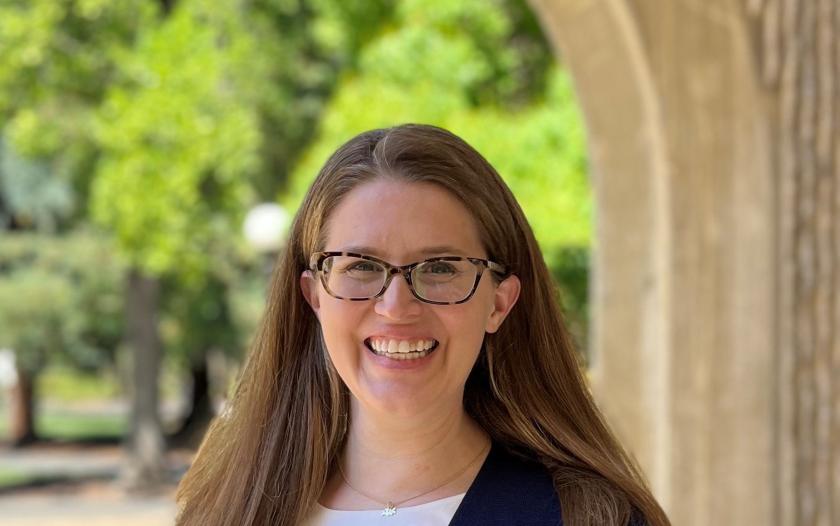Harnessing Data Science to Drive Change: New Undergrad Major to Launch Future Leaders

What kind of future is possible if you want to apply your technical skills and you care about serving your community?
In college, I had meaningful academic experiences as part of my math major, and impactful personal experiences through my service-leadership scholarship. As I looked toward a career, I wanted to combine these interests, but my goal to work at the intersection of math and service felt nebulous, intangible, and even a little naive or pollyannaish.
Today, this intersection feels much more real than imagined to me. I’m constantly in awe of how friends, colleagues, mentors and professional heroes use data and technology to make progress on some of society’s toughest problems: protecting children from hate speech online, using data to combat world hunger, and working to reduce bias in AI-supported decision-making.
Yet, students have shared with me that this intersection still sometimes feels unclear and difficult to navigate. They are not quite sure how to find opportunities, consider potential trade-offs, or map a five or ten-year plan in this field. Just as I did, they find it hard to envision the details of a future that lets them put data science to work for society.
We launched the Data Science & Social Systems major at Stanford to more clearly define this pathway for students and equip them with the tools needed to lead in industry, government, or the nonprofit sector.
Interdisciplinary thinking is essential for the data-driven analysis of complex social problems, and this program is designed to prepare students with both superb technical training and in-depth knowledge of the social sciences.
Students in the major will complete a data science core including courses in computer science, math, statistics, and optimization; and a behavioral science core including courses in psychology, sociology, political science, and economics. During the major’s gateway course, students will see concrete examples of how professors across the university are using data science to affect change in their fields. Ethics courses are also a critical component, as appreciating the limits of technology and understanding how and when its use can harm communities is vital.
While combining math and service has always been my professional north star, not all of my attempts to align the two have been clear wins. Some of my jobs have been, frankly, boring. Some of my work has felt isolating and disconnected from the world, the opposite of how I feel during my best service experiences. I worked on one project where we built a complex and fancy model and our only results felt like things that everyone already knew. I was frustrated — how exactly was all this math helping anyone?

My eureka moment came when coding in the back of a taxicab
During my PhD, my advisor and I worked with New York City’s Department of Health and Mental Hygiene (NYC DOHMH) to develop an approach for improving the detection of outbreaks of rare or novel diseases. We collaborated with NYC DOHMH throughout, and as I was finishing my dissertation, I had the opportunity to spend a week at their office to see firsthand some of the challenges they encountered. One day, running late to a meeting and pressed for time to incorporate feedback into our tool, I found myself coding in the back of a cab. Trying to track tiny lines of Python while on bumpy city streets is a perfect recipe for a headache, so part of me wondered what the heck I was doing!
Yet, this moment also helped me realize that my week — and my headache of a cab ride! — offered exactly what I had sought: work that combined my technical skills with a commitment to service. Together with NYC DOHMH, I was developing a data science approach to address an important problem, and because I was working on a team with public health practitioners, I knew that what we were making would provide practical value to their organization.
I now firmly believe in community-based research and in impact labs that bring together “problem-focused teams of scholars and practitioners who are highly-motivated to work together to make progress on social problems [and] connect research to practical solutions.”
I’m excited that our new major is being incubated by Stanford Impact Labs and that it will be infused with Stanford Impact Labs’ commitment to collaboration with external partners and interdisciplinary work, and share its ambition of using cutting-edge tools to make progress on society’s hardest problems. One way this will manifest in the major is through our capstone, where student teams will partner with nonprofits and government organizations to put data science skills to use on an important social problem.
As we launch our major this fall, I’m excited to:
1. Build our Data Science & Social Systems community
As our program grows and evolves, I’m looking forward to getting to know students, alumni, data scientists and community partners. I’d love to hear from you: what else do you think our program should include? What should it avoid? What confuses you about our program? What are you excited about? Please fill out this form to share your thoughts. No idea is too big or too small.
A special shout-out to all students interested in Data Science & Social Systems:
- I’d love to meet you and learn more about your interests! Our inspiring faculty director, Jeremy, our wonderful student services officer, Amanda, and our great group of peer advisors would also love to meet you.
- Come chat with me during drop in hours — go here for details and to sign up. We can talk about if this is the right major for you, identify professors and potential advisors who share your interests, brainstorm internship or job opportunities, or map out your 4-year plan.
- Don’t forget to follow us on Instagram and LinkedIn and sign up for our mailing list!
- If you are an alumni who would like to connect with us or be a mentor to our students, please email me at mnobles@stanford.edu.
2. Welcome incredible data scientists to Stanford to learn about their career paths
To celebrate the launch of our new program, we are hosting a speaker series and a one-unit course this autumn called Data Science@Work. Ten amazing data scientists who are working in government, tech, nonprofits and journalism will come to Stanford to share how they’ve built careers that combine what they are good at, what they love, what the world needs, and what they can be paid for.
3. Work with faculty across the university to develop our gateway course
Ten faculty members from the schools of Humanities & Sciences, Engineering, Sustainability, and Education are working together to develop curriculum for our gateway course to the major, Solving Social Problems with Data. We will offer this course for the first time in Spring 2023.
As work across nearly all domains becomes increasingly data-driven, data science has an important role to play in achieving progress on critical social problems. We are excited to build a major that prepares students to step up to this challenge. Join me, and let’s get to work together!
